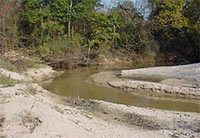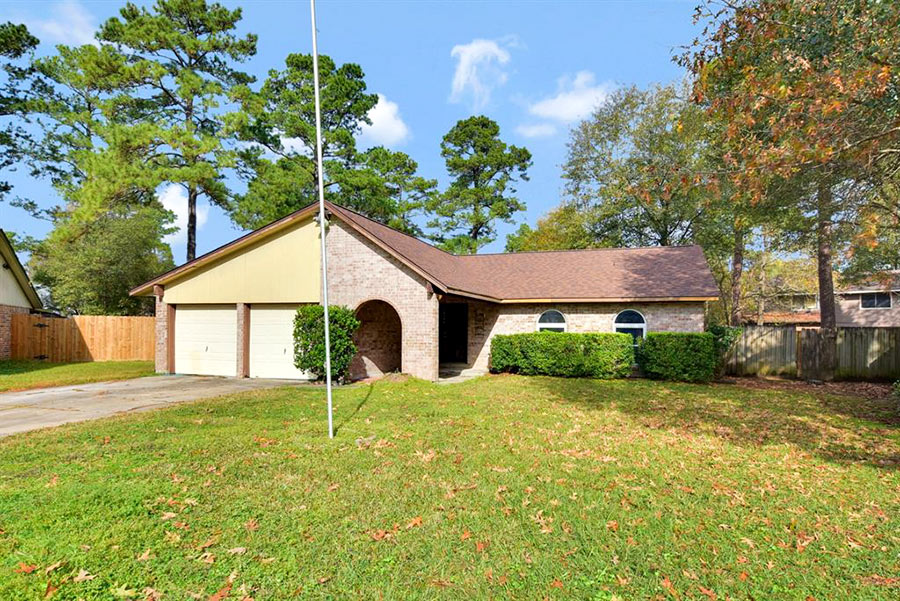A LITTLE ELECTION DAY MUD-SLINGING IN SPRING  A $58 million bond measure to reimburse developer DR Horton for utility and road construction on 400 soon-to-be-developed acres just south of The Woodlands and east of Gosling Rd. is expected to pass in today’s election by a mere 2 votes. The couple expected to account for the winning margin just moved into the area in a trailer they’ve parked in a clearing. And, yeah, they’ll be the only people allowed to vote on the measure. Does this sound like a strange picture in an elective democracy? It’s the normal course of events for establishing municipal utility districts on empty land. 659 MUDs are currently active in the Houston area; since 2009, 88 new ones have been established statewide. [Houston Chronicle] Photo of Willow and Spring Creeks: Northampton MUD
A $58 million bond measure to reimburse developer DR Horton for utility and road construction on 400 soon-to-be-developed acres just south of The Woodlands and east of Gosling Rd. is expected to pass in today’s election by a mere 2 votes. The couple expected to account for the winning margin just moved into the area in a trailer they’ve parked in a clearing. And, yeah, they’ll be the only people allowed to vote on the measure. Does this sound like a strange picture in an elective democracy? It’s the normal course of events for establishing municipal utility districts on empty land. 659 MUDs are currently active in the Houston area; since 2009, 88 new ones have been established statewide. [Houston Chronicle] Photo of Willow and Spring Creeks: Northampton MUD





MUD’s are a development vehicle designed to encourage development without stressing local government and existing tax bases.
Originally, Houston grew buy allowing a MUD to develop. The MUD would pay off it’s bond debt, then Houston would annex it.
Years ago, the annexation part stopped because of two situations. One was the fiasco of annexing the Clear Lake area and Kingwood. The other is that there is no benefit for the city of Houston from a revenue side to annex MUD’s anymore.
If you want to full history of MUD’s, there is a book called “Metes and Bounds” that explains all of it.
SOP…I did work for The Woodlands Corp. back in the early 90’s in a brand new neighborhood with 2 homes that were “MUD District Homes”. The area was in a brand new Village called Alden Bridge back in the day. There were no streets, although the street had been cleared for what became Morning Cloud Circle in front of these homes. There was no water or sewer service for these 2 brand new homes just west of the Bear Branch tributary off Research Forest Dr. Both of these brand new homes shared a water well and had septic systems at the time.
It was my understanding that the residents were employees of The Woodlands Corp and were renting cheap from The Woodlands Corp. and as well. They also were the only residents and voters in a proposed new MUD district. They also were the only voters to vote on the proposed setup of the new MUD district. They were hooked up to the utilities once the MUD district was established and utilites completed.
There also used to be 2 small homes on Grogans Mill close to The Woodlands Pavilion that were also “MUD district homes” and I heard were also occupied by Woodlands Corp. employees. They also were the only residents in what became the Woodlands Town Center MUD districts. They were torn down years ago for apartments.
this one?
http://www.amazon.com/Metes-Bounds-Novel-Southern-Tier/dp/1560231858
Welfare for the wealthy – again! We foot the bill.
@Michael, the only people footing the bill will be those who purchase property in the new development. Without the MUD’s, developers would have to recover their costs of required infrastructure (sewer and water, mostly) from buyers, which would make the properties prohibitively expensive. With the MUD, everyone is happy, generally.
Can’t tell if the comment by james was sarcastic, but the book that kjb is referring to is http://www.amazon.com/Growing-Metes-Bounds-Utility-Districts/dp/B001QHHC16/ref=sr_1_1?s=books&ie=UTF8&qid=1352268808&sr=1-1&keywords=growing+by+metes+and+bounds
MUDs are the way to keep home prices in Houston low, although property tax % is generally higher.
These comments remind me of a sign I saw recently on a grammar blog: Every time you use an apostrophe to make a word plural, a puppy dies.
@Michael, MUD raises money by selling bonds on an open market and is repaid by revenue from private property owners of that development, so who’s exactly footing the bill here? I’m sure you can Google it on your Obama Phone.
So how else are you gonna pay for infrastructure?
You could factor the cost into the home prices. But then the interest payed on the infrastructure is contingent on individual borrowers’ creditworthiness. If I go buy a spec home with 2% down on a 30-year fixed, I’m going to pay a higher rate then the MUD. This just gives more money to the banks.
Alternately, you could form a Local Improvement District. A LID is like a MUD except it’s administered by the city. But a LID shifts all the downside risks onto the municipality – the homeowners could all move out, and the city would be stuck with the tab. In this case the taxpayers end up paying for a failed development.
Whereas with a MUD, all of the downside risk is borne by the bondholders. And if the bondholders pursue a judgement, it will be against the property owners, not the municipality.
A MUD thus represents the *least* transfer of wealth to the “wealthy” of all conceivable options. If you were camping out in Eleanor Tinsley Park with a “we are the 99%” sign, you should be pro-MUD.
@kjb: Why is there no longer a revenue benefit to CoH in MUD annexation?
MUDs are perfectly good tools to finance public improvements. The issue is whether the developer can basically have the unilateral right to set up a MUD by having some employees move into a spec house or mobile home on a tract of land that has not been developed at all or whether the issue should be put to all the voters in the county. If the development is a terrible idea and goes bust, the surrounding community will have to bear the burden of policing the empty development as well as the other externalities that come with having a couple of acres of roads leading to lots full of plumbing hookups coming out of the ground. If a developer is going to be able to get roads and utilities built on its timeline while the rest of the community has to wait in line for funding to fix up their streets, at least give the community a check on that power by putting the creation of the MUD to a real vote.
Subordinating MUD creation to the countywide electorate would just provide a means for people to block projects they don’t personally like. We all saw this happen with Ashby over “traffic” concerns.
In practice, the developments most likely to go “bust” – say, a smaller MPC well beyond the current developed fringe – would be the ones that get approved for lack of opposition, while developments that are a “slam dunk” (e.g., infill small-lot townhomes in an area mostly built-out as large lot single family) would be blocked due to NIMBY concerns.
That’d be counterproductive, I think.
Also, Harris County is one of the most populous counties in the country. It is unreasonable that somebody from Deer Park should have say over a new development in Cypress.